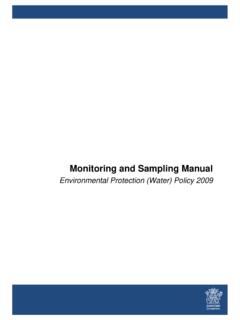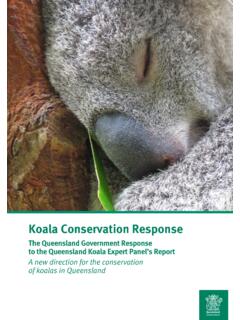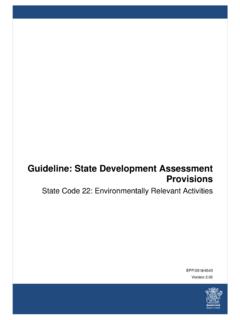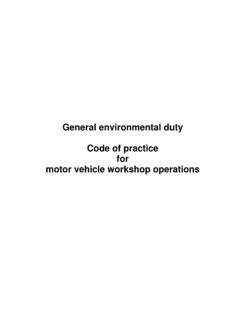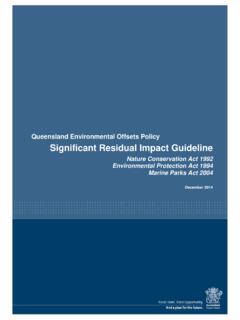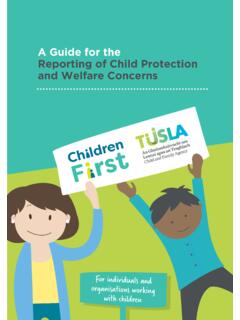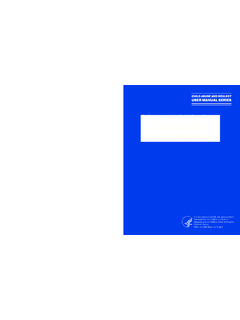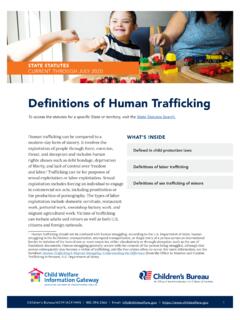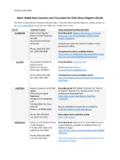Transcription of Department of Environment and Science Enforcement …
1 Department of Environment and Science Enforcement Guidelines ESR/2021/5549 | Version | Last Reviewed : 31 JULY 2019 Prepared by: Litigation branch, Department of Environment and Science State of Queensland, 2019. The Queensland Government supports and encourages the dissemination and exchange of its information. The copyright in this publication is licensed under a Creative Commons Attribution Australia (CC BY) licence. Under this licence you are free, without having to seek our permission, to use this publication in accordance with the licence terms. You must keep intact the copyright notice and attribute the State of Queensland as the source of the publication. For more information on this licence, visit Disclaimer These guidelines do not bind the Department in the exercise of its discretion with respect to the use of its statutory tools and initiation of legal proceedings.
2 It is intended as a guide only. If you need to access this document in a language other than English, please call the Translating and Interpreting Service (TIS National) on 131 450 and ask them to telephone Library Services on +61 7 3170 5470. This publication can be made available in an alternative format ( large print or audiotape) on request for people with vision impairment; phone +61 7 3170 5470 or email July 2019 ESR/2021/5549 | Version | Last Reviewed : 31 JULY 2019 3 Contents 1 Introduction .. 4 Scope .. 4 Purpose .. 5 Procedure .. 5 Principles .. 6 2 Who Enforcement action will be taken against .. 6 Identification of offender(s) .. 6 Notification .. 6 Corporate liability .. 7 Liability of employees and 7 Liability of directors and executive officers.
3 7 Unlicensed operators .. 8 Liability of external administrators .. 8 Liability of government agencies .. 8 3 Choice of Enforcement action .. 9 Determining seriousness of a contravention of legislation .. 9 Objectives of legislation .. 9 Impact .. 9 Culpability .. 10 Table 1. Criteria to be considered in determining impact of the contravention .. 11 Table 2. Criteria to be considered in determining culpability of alleged offender .. 12 Application of objectives of legislation, impact, and culpability .. 13 4 Warning letters .. 13 5 Infringement notices .. 13 6 Administrative actions .. 14 7 Civil proceedings for court orders .. 15 8 Enforceable undertakings .. 15 9 Prosecution .. 15 The decision to prosecute .. 15 Prospects of success.
4 15 Public interest considerations .. 16 Choice of charges .. 16 Mode of trial summary or indictable proceedings .. 17 Charge negotiations .. 17 Sentencing considerations .. 17 Sentencing orders .. 18 Recording of convictions .. 18 Appeals against sentence .. 19 10 Suspension or cancellation of licence, permit or authority .. 19 ESR/2021/5549 | Version | Last Reviewed : 31 JULY 2019 4 1 Introduction Queensland s economic, social and ecological welfare relies upon the sustainable management of its Environment and conservation of its heritage. The Queensland Government is committed to ecologically sustainable development protecting the ecological processes on which life depends while allowing for development that improves the total quality of life, both now and in the future.
5 The Department of Environment and Science is the government s lead agency for the administration of legislation that protects, conserves and manages Queensland's Environment and heritage. The Department has produced a solid policy platform on which it has built partnerships with the community and industry to encourage greater understanding of sustainable conservation, environmental and heritage practices and support for innovation. To build a culture of compliance where individuals, business and industry take responsibility for ensuring that their activities do not cause unlawful impacts the Department will sometimes need to take Enforcement action. Enforcement action provides a strong deterrent to non-compliance.
6 The effective protection of the Environment , as well as good regulatory practice, calls for the Department to have clear guidelines governing the taking of Enforcement action. These Enforcement Guidelines complement the Department 's Strategic Plan, and other documents which set out the Department 's approach to its Enforcement activities (available on the Department 's website). To the extent possible in the circumstances, it is the goal of the Department 's Enforcement responses to: reinforce legal obligations under legislation achieve outcomes consistent with legislation deter non-compliant behaviour assertively apply consistent and proportionate Enforcement action. Scope The Department administers a number of pieces of legislation, including: Coastal Protection and Management Act 1995 Environmental Protection Act 1994 Environmental Offsets Act 2014 Forestry Act 1959 Marine Parks Act 2004 Nature Conservation Act 1992 Queensland Heritage Act 19921 Recreation Areas Management Act 2006 Waste Reduction and Recycling Act 2011 Water Act 2000 (Chapter 3) Wet Tropics World Heritage Protection and Management Act 1993.
7 Under these pieces of legislation there are also a number of different government authorities that may also have delegated or devolved powers, such as the police or local governments. To ensure consistency and transparency of Enforcement actions, these Enforcement Guidelines apply to decisions about Enforcement actions made by the Department in administering its legislation. It is also intended to guide decisions made under this legislation by other 1 The Department may also take compliance action under the Planning Act 2016 with respect to development offences, including in relation to Queensland heritage places. ESR/2021/5549 | Version | Last Reviewed : 31 JULY 2019 5 authorities, however it does not bind these authorities.
8 Purpose These Enforcement Guidelines assist the Department and other relevant authorities in making decisions about taking Enforcement action under legislation administered by the Department . The guidelines set out principles of a general nature to provide an understanding of how the Department will approach Enforcement . The Department publishes its Enforcement Guidelines as part of its commitment to transparency in its compliance activities, and to educate the public about the Department 's expectations and compliance approach. People and businesses who have specific obligations under legislation administered by the Department are encouraged to familiarise themselves with these guidelines. It is important to note that these are guidelines and not directions.
9 They are designed to assist the making of Enforcement decisions to achieve consistency, efficiency, effectiveness and transparency in the administration of legislation by the Department . Procedure The Department will assess all notifications it receives of possible contraventions of its legislation, and based on these assessments and any associated investigations, will make decisions as to the appropriate response. In some cases, the decision may be to take no action, for example, if an investigation reveals that no contravention of the legislation has occurred. In some cases, the Department may provide advice, guidance, or assistance to help a person comply with the legislation. In other cases, it may be necessary for the Department to take Enforcement action in response to a contravention of the legislation.
10 In these guidelines, Enforcement action includes any action taken to punish a contravention of legislation administered by the Department , to deter or prevent a person or persons from committing future contraventions of the legislation, or to require someone to remedy or stop committing a contravention of the legislation. Enforcement actions do not include measures intended only to inform or educate a person, and do not include investigations into alleged contraventions of legislation although such investigations may be required to inform various Enforcement actions. The range of Enforcement actions available to the Department includes: warning letters penalty infringement notices administrative notices and orders made under legislation proceedings for court orders provided for under legislation prosecution suspension or cancellation of permit, licence or authority.


